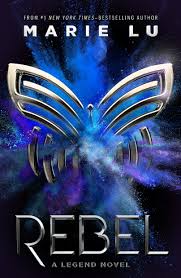
Rebel
Chapter 23: Ross City: Eden 12
by Lu, MarieThe chapter begins with Dominic Hann fulfilling his promise to release Daniel, as the narrator watches the event unfold via a live feed. Daniel, tied to a chair, manages to break free after a scuffle with guards, showcasing his skill at evading capture. Despite stumbling, he nearly escapes on his own, but the guards ultimately intervene. To the narrator’s surprise, they blindfold Daniel and escort him to the Undercity streets, where he is found by AIS agents, possibly including June Iparis. The narrator is left bewildered by Hann’s decision to release Daniel.
Daniel’s escape sparks a mix of hope and uncertainty in the narrator. They believe Daniel will return to rescue them, driven by his determination. However, the narrator questions whether this will matter if Hann succeeds in his plans. The chapter hints at Hann’s dangerous ambitions, which involve a machine powered by the narrator’s engine. The narrator describes this invention as both awe-inspiring and horrifying, suggesting it has catastrophic potential.
The narrator’s emotional turmoil is palpable as they reflect on the parallels between Daniel’s near-capture and the fate of John, a past tragedy. The guards’ unexpected decision to spare Daniel adds to the tension, leaving the narrator questioning Hann’s motives. The scene underscores the unpredictability of their situation and the looming threat posed by Hann’s machine, which could destabilize Ross City.
The chapter ends on a foreboding note, with the narrator acknowledging the impending collapse of Ross City. Hann’s machine, now operational, represents a turning point in the story, merging technological terror with personal stakes. The narrator’s hope for rescue clashes with the grim reality of Hann’s power, leaving their future—and the city’s—hanging in the balance. The stage is set for a high-stakes confrontation, with Daniel’s freedom serving as a fleeting respite in a larger, unfolding crisis.
FAQs
1. How does Daniel manage to escape, and what role does Dominic Hann play in his release?
Answer:
Daniel initially escapes through his own resourcefulness, breaking free from his bonds and outmaneuvering the guards, showcasing his past expertise in evading Republic soldiers. However, his escape is ultimately facilitated by Dominic Hann’s promise to release him. When Daniel stumbles, the guards, following Hann’s orders, capture him but then release him into the Undercity streets. This suggests Hann’s control over the situation, as he ensures Daniel’s freedom while maintaining his own agenda. The scene highlights the tension between Hann’s promises and his underlying motives.2. What emotions does the narrator experience while watching Daniel’s escape, and how do these reflect their relationship?
Answer:
The narrator experiences a mix of numbness, hope, and terror. They watch Daniel’s escape with a dry throat and dizziness, overwhelmed by both admiration for his skill and fear for his safety. The narrator’s certainty that Daniel will return for them reveals deep trust and reliance on their brother. However, their uncertainty about Hann’s intentions and the looming threat to Ross City adds complexity to their emotions, showing how their bond is intertwined with larger, uncontrollable forces.3. Why is the narrator both awed and terrified by Hann’s machine, and what implications does this have for Ross City?
Answer:
The narrator describes Hann’s machine as “spectacular and terrifying” because of its destructive potential when powered by their engine. This duality reflects the danger of technological power in the wrong hands. The machine’s capability suggests Hann’s plan could destabilize Ross City, as hinted by the narrator’s ominous statement: “Ross City is about to crumble.” The narrator’s awe underscores the machine’s ingenuity, while their terror foreshadows its catastrophic consequences for society.4. Analyze the significance of June Iparis’s possible appearance in the feed. What might this imply for the story’s broader conflict?
Answer:
June Iparis’s potential appearance among the AIS agents suggests a convergence of key figures in the narrative. As a prominent character in the series, her involvement could signal escalating tensions between Hann’s faction and the Republic’s forces. Her presence may also hint at a larger resistance or surveillance operation targeting Hann’s activities. This moment bridges personal stakes (Daniel’s rescue) with the overarching political conflict, foreshadowing a collision between individual survival and systemic power struggles.5. How does the chapter’s closing line, “Ross City is about to crumble,” create suspense, and what themes does it reinforce?
Answer:
The line serves as a dramatic cliffhanger, emphasizing the imminent collapse of societal order due to Hann’s actions. It reinforces themes of power, technological hubris, and fragility, as Hann’s machine threatens to destabilize the city. The narrator’s perspective—rooted in both personal stakes (Daniel’s freedom) and systemic consequences—heightens the suspense by merging individual and collective doom. This foreshadowing invites readers to question who will survive and what resistance might emerge against Hann’s plans.
Quotes
1. “Sometimes it’s easy to forget that my brother used to be the master of avoiding the Republic’s soldiers.”
This quote highlights Daniel’s survival skills and past experiences, emphasizing his resilience while also foreshadowing his eventual escape. It serves as a reminder of the characters’ shared history in a world of conflict.
2. “He’s going to come back for me, that I know with a dead certainty and a wild hope.”
A powerful statement of sibling loyalty and determination, this quote captures the narrator’s mixed emotions of both absolute faith and desperate optimism about their brother’s rescue attempt.
3. “It’s one of the most spectacular and terrifying inventions I’ve ever seen.”
This quote reveals the dual nature of Hann’s machine - both impressive and horrifying - setting up the central conflict about technology’s destructive potential that threatens Ross City.
4. “Ross City is about to crumble.”
The chapter’s ominous closing line serves as both a prophecy and a warning, encapsulating the impending disaster that forms the book’s central tension. This brief statement carries tremendous weight for the story’s direction.
